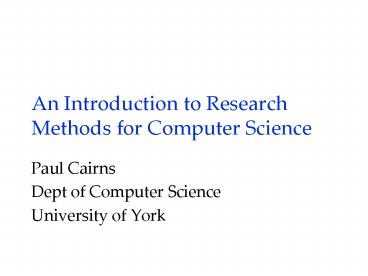An Introduction to Research Methods for Computer Science - PowerPoint PPT Presentation
1 / 31
Title:
An Introduction to Research Methods for Computer Science
Description:
Statistical machines. Turn data into probabilities. Match machine to the data. Standard repertoire. T-test, F-test (ANOVA), correlation, chi-squared, Mann-Whitney, ... – PowerPoint PPT presentation
Number of Views:40
Avg rating:3.0/5.0
Title: An Introduction to Research Methods for Computer Science
1
An Introduction to Research Methods for Computer
Science
- Paul Cairns
- Dept of Computer Science
- University of York
2
Purpose of Class
- Very brief intro to Research Methods
- working with people
- Your own research needs
- Framing your research
3
Introductions
- Name
- Paul Cairns
- First degree/doctorate
- DPhil in Mathematics, General Topology
- Current research topic (one sentence)
- What does it mean to be immersed in a videogame?
4
What is a research method?
5
Learning RM
- Psychology, social sciences
- Not maths, physics, CS, chemistry
- CS research is teleological
- intended to change things
6
Types of method
- Collection plus analysis
- Quantitative
- Data and results numerical
- Qualitative
- Data anything, results textual
7
Example methods
- Experiments
- Statistics
- Surveys
- Interviews
- Grounded theory
- Case study
- Observations
- Ethnography
- Discourse analysis
- Content analysis
- Focus groups
- Longitudinal studies
- Thematic analysis
8
Today
- Experiments, statistics (quant)
- Grounded theory (qual)
- Case studies (qual)
- Thurs your work, narratives
9
Experiments
- Numerical data
- Sample
- Statistics
- But what for?
10
Experimental argument
- Belief X causes Y
- So change X and measure Y
- But
- people vary!
- other things affect Y
- hard to measure Y
- Experiments pierce through the murk!
11
Experimental design
- Change only X
- Control everything else you can
- Randomise what you cant control
- Measure Y
- Use statistics to see real differences
12
Example
- What are the independent and dependent variables?
- What is the experimental hypothesis?
- What also might affect the dependent?
- How might people differ?
- What might be wrong with the study?
13
Samples
- People who do you experiment
- participants
- Representative of population
- Whats a population?
- Unbiased
- Modest size
14
Inferential statistics
- People vary
- Measures therefore vary
- Is variation systematic or chance?
15
Example
- You have three systems, A,B and C. You show 30
people all three and to state their preference.
You get - 15 prefer A, 7 prefer B and 8 prefer C.
- Which is the most preferred system?
16
Gold standard statistical argument
- Make a prediction
- Assert null hypothesis
- Gather data fairly
- Calculate probability of outcome
- If significant, supports your theory
17
Consequences
- No prediction, no good
- Dont over-test
- No proof of hypothesis
18
Statistical machines
- Turn data into probabilities
- Match machine to the data
- Standard repertoire
- T-test, F-test (ANOVA), correlation, chi-squared,
Mann-Whitney, Wilcoxon
19
Pros and cons
- Highly supported method
- High validity
- Lot of craft skill
- Small questions
- One experiment is not enough
20
Grounded theory
- Hypothesis seeking
- Interview
- Analysis
- Descriptive theory (grounded in data)
21
Approach
- Some (vague) phenomenon
- Semi-structured interviews
- Analyse, develop theory
- Adapt interviews
22
Example Sarah Faisal
- What is user experience of using an information
visualisation? - Interaction and subjective experience are key but
how?
23
Semi-structured interview
- Schedule of questions
- No order or necessity
- Explore matters arising
24
Devising questions
- Open
- Is user experience like A or B?
- Unbias
- Did you like this system?
- Unembarrassing
- Why did you make that mistake?
25
Coding
- Open coding
- Open to new concepts
- Selective coding
- Grouping, categorising concepts
- Axial coding
- Relating concepts
- Storyline
26
Theoretical sampling
- Choose your interviewees
- Fill out theory
- Explore limitations
- Saturation
27
Tricks for coding
- Microcoding
- Asking questions
- Memoing
- Example
28
Final theory
- Headline
- Good user experience arises from a harmonious
flow between interaction and internalization - Description of the data
- Recontextualise in the literature
- Instrumental genesis
29
Validity?
- Is it objective?
- Is it honest?
- Is it verifiable?
30
Homework
- Write a fantasy abstract for a paper or a large
study in your PhD (200-300 words) - Must include
- Title of work
- Problem to solve
- Key research findings
- Why this is better than other peoples work
- Fantasy impact (200 words max)
31
(No Transcript)































